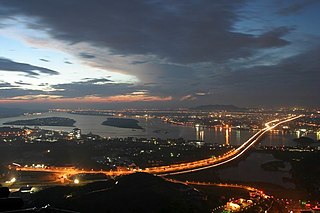
The Xi River or Si-Kiang is the western tributary of the Pearl River in southern China. It is formed by the confluence of the Gui and Xun Rivers in Wuzhou, Guangxi. It originates from the eastern foot of the Maxiong Mountain in Qujing City, Yunnan Province. Then it flows east through Guangdong, and enters the Pearl River Delta just east of the Lingyang Gorge in Zhaoqing. The main branch of the Xi River flows southeast through the delta entering the South China Sea at Modao Men, just west of Macau. The major cities along the Xi include Wuzhou, Zhaoqing, and Jiangmen.
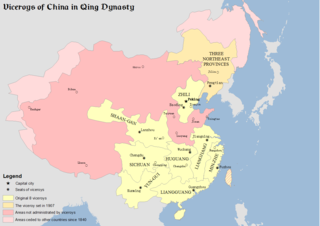
Zongdu, usually translated as Viceroy, Head of State or Governor-General, governed one territory or more provinces of China during the Ming and Qing dynasties.

The Battle of Bang Bo, known in China as the Battle of Zhennan Pass, was a major Chinese victory during the Sino-French War. The battle, fought on 23 and 24 March 1885 on the Tonkin-Guangxi border, saw the defeat of 1,500 soldiers of General François de Négrier's 2nd Brigade of the Tonkin Expeditionary Corps by a Chinese army under the command of the Guangxi military commissioner Pan Dingxin.

The Jintian Uprising was an armed revolt formally declared by Hong Xiuquan, founder and leader of the God Worshipping Society, on 11 January 1851 during the late Qing Dynasty of China. The uprising was named after the rebel base in Jintian, a town in Guangxi within present-day Guiping. It marked the beginning of the Taiping Rebellion.

Pingxiang (凭祥市) is a county-level city under the administration of the prefecture-level city of Chongzuo, in the southwest of the Guangxi Zhuang Autonomous Region, China.

Shi Dakai, born in Guigang, Guangxi, also known as Wing King or phonetically translated as Yi-Wang, was one of the most highly acclaimed leaders in the Taiping Rebellion and a poet.
The Constitutional Protection Movement was a series of movements led by Sun Yat-sen to resist the Beiyang government between 1917 and 1922, in which Sun established another government in Guangzhou as a result. It was known as the Third Revolution by the Kuomintang. The constitution that it intended to protect was the Provisional Constitution of the Republic of China. The first movement lasted from 1917 to 1920; the second from 1921 to 1922. An attempted third movement, begun in 1923, ultimately became the genesis for the Northern Expedition in 1926.

Shen Hongying or Shum Hung-ying was a Chinese general in the Old Guangxi Clique during the Republic of China (1912–1949). Shum was given the title of General Hip Wai (協威將軍) by President Li Yuan-hong (黎元洪總統). Shen served as military governor of Guangdong from March 1923 to May 1924 in the Warlord Era. He was in alliance with Wu Peifu. He was defeated by Li Zongren in 1925.

Cen Chunxuan, courtesy name Yunjie, was a Zhuang Chinese politician who lived in the late Qing dynasty and Republic of China.

Luo Xian Xiang (1890–1968) was a World War II Chinese general. He was a soldier, and at times, as regional government official; he established anti-corruption policies and conducted administrative and education reforms. He was born in Sihui, Guangdong Province, where Cantonese is the native tongue.

The Yiwu Zhi or Record of Foreign Matters, also known as the Jiaozhou Yiwu Zhi (交州异物志), Nanyi Yiwu Zhi (南裔异物志), Jiaozhi Yiwu Zhi (交趾异物志) and Yangyilang Zhushu (杨议郎著书) amongst others, is a treatise written by Eastern Han court advisor Yáng Fú (杨孚) covering the people, geography, fauna, rice cultivation, fruit, trees, grass, bamboo, insects and fish of the South China Sea region. It is the first written Chinese account of the Lingnan area's produce, production methods and aboriginal customs and uses a detailed methodology that would be adopted as standard by later works of this genre including the Nanfang Caomu Zhuang, Linhai Shuishang Yiwu Zhi (临海水上异物志), Nanzhou Yiwu Zhi (南州异物志), Hainan Yiwu Zhi (凉州异物志), Bashu Yiwu Zhi (巴蜀异物志), Funan Yiwu Zhi (扶南异物志), Lingnan Yiwu Zhi (岭南异物志), Nanzhong Bajun Yiwu Zhi (南中八郡异物志), Guangzhou Yiwu Zhi (广州异物志), and Lingbiao Luyi (岭表录异).

Cen is the Mandarin pinyin romanization of the Chinese surname written 岑 in Chinese character. It is romanized Ts'en in Wade–Giles, and variously as Sam, Sum, Sham, Shum in Cantonese, Gim, Khim, Chim in Taiwanese Hokkien and Chen in other pinyin forms. Cen is listed 67th in the Song dynasty classic text Hundred Family Surnames. As of 2008, it is the 235th most common surname in China, shared by 340,000 people. Cen is considered a rare surname. A person with a rare surname like Cen may be able to trace his or her origins to a single ancestral area.
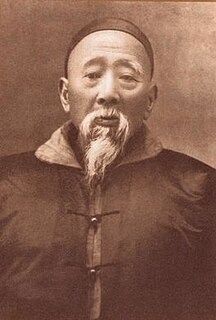
Zhou Fu was a Han Chinese official of the Qing dynasty. He was Viceroy of Liangjiang in 1904–1906 and Viceroy of Liangguang in 1906–1907.
Pan Dingxin was a Qing dynasty governor and military commander of the Huai Army, best known for his role in the Sino-French War.
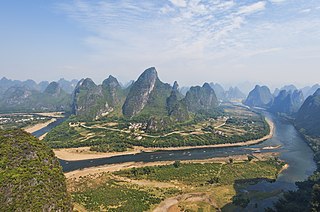
Guangxi, officially the Guangxi Zhuang Autonomous Region (GZAR), is an autonomous region of the People's Republic of China, located in South China and bordering Vietnam and the Gulf of Tonkin. Formerly a province, Guangxi became an autonomous region in 1958. Its current capital is Nanning.
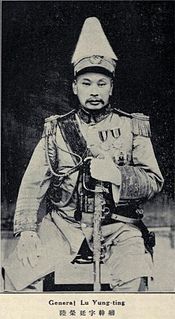
Lu Rongting, also spelled as Lu Yung-ting and Lu Jung-t'ing, was a late Qing/early Republican military and political leader from Wuming, Guangxi. Lu belonged to the Zhuang ethnic group.

The Military Government was a Constitutional Protection Junta established by the Kuomintang in Guangzhou in opposition to the Beiyang government on 1 September 1917, after the beginning of the Constitutional Protection Movement on 17 July 1917.

Guangdong independence refers to the autonomy/independence of Guangdong or Cantonese-majority areas from China. These movements wanted to establish an independent or autonomous political entity. In modern China, this idea has been put forward by others including Kang Youwei's followers and Ou Jiajia. Kang Youwei's followers later opposed the claim. In his book "New Guangdong", Ou Shi put forward the idea of establishing "Guangdong of Guangdong". In 1911, there was a revolution. At the end of October 1911, members of the Guangdong Alliance Chen Jiongming, Deng Jun and Peng Ruihai organized civil army uprisings throughout Guangdong. On November 9, Chen Jiongming led his troops to restore Huizhou. On the same day, Guangdong announced independence and established the Guangdong Military Government of the Republic of China. On January 1, 1912, the Republic of China was established, and Guangdong Province became a province in the Republic of China. In the early years of the Republic of China Guangdong Province drafted the "Guangdong Provincial Draft". This is inspired by the idea of autonomous provinces. The draft passed by the Guangdong Provincial Assembly on December 19, 1921. However, this proposal for the future planning of Guangdong Province did not receive sufficient support, and it was aborted as the Soviet forces intervened in the Far East and the KMT and the Communist Party went northward.

Shuikou is a town in Longzhou County, Chongzuo, Guangxi, China. It is a border town of Tà Lùng in Vietnam. Due to its location on the border crossing to Vietnam and its educational and medical infrastructure, Shuikou is of regional importance.
The Reserve Infantry Division of Guangxi(Chinese: 广西陆军预备役步兵师) is a reserve infantry formation of the People's Liberation Army.

















